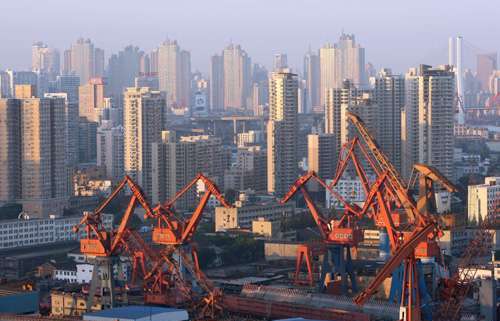A time to end 'investment hunger'
- By Tan Haojun
 0 Comment(s)
0 Comment(s) Print
Print E-mail China.org.cn, July 12, 2013
E-mail China.org.cn, July 12, 2013
|
|
|
As long as the government works hard on its plans for "revitalization" reforms and does not make the "investment hunger" mistake again, China won't suffer inflation. [File photo] |
China's Consumer Price Index (CPI) in June of 2013 rose 2.7 percent compared with the same period of last year, according to the latest economic data released by the National Bureau of Statistics (NBS) on July 9. However, the Producer Price Index (PPI) fell 2.7 percent compared with that over the same period of last year, and declined 0.6 percent from that of May.
The worsening trend is the result of the abnormal production and operation of enterprises caused by an insufficient market demand. A severe shortage in productive demands caused for the PPI to lack strong support and spiral down into its negative operation. In addition to the failing market demand, the decline also depended on industries' excess production capacity, which leads to serious imbalances in economic structure as well as imbalances on the consumption market.
Clearly, the problems such as an imbalance of economic structure or the excess production capacity of some industries are related to the excessive emphasis on investment a few years ago. China is now harvesting the bitter crops caused by its "investment hunger."
To be honest, for developing countries like China, investment is an important factor to push forward economic growth. To some extent, it is the most important factor. However, it is neither the universal method nor the only way. On the one hand, investment has requirements in terms of structure, efficiency and quality. It also needs to consider other factors – overall number of investment, scale control, structured distribution, layout and regional coordination – in order to promote the quality and efficiency of the investment.
If the government just focuses on the number and scale of investment, rather than considering quality, efficiency and layout, it will impose a discount on an investment's function within the economy. Even if it has some effect over a short period of time, it is not sustainable. More importantly, its negative function will be enlarged following the increase of the investment.
On the other hand, its promotional function should tightly coordinate with export and especially with consumption, which should be the most important condition for any investment. The arrangement of investments has to serve consumption and comply with the consumer demand.
Although China witnessed this "investment hunger" in the 1980s and 1990s, it was based on a real economy. Investment mainly depended on bank loans, so whenever a high demand for investment appeared, it was easy to regulate through credit. In addition, as China was facing unprecedented good export conditions during the 1997 Asian financial crisis, the contribution of investment to the growth of national economy was positive and obvious.
However, since entering the 21 century, the real estate market has opened up and various financing tools were made available. Local governments' passion for investment soared. Instead of making productive investments, investments in non-productive projects – urban construction, infrastructure construction and real estate development – became the force majeure to promote economic development. What's worse, social resources also transferred onto non-productive projects, making the inside of a previously real economy turn hollow.
Of even greater importance was the over-intervention of governments in investment, resulting in the increasingly weaker functioning of the market mechanism in the allocation of social resources. When the 2008 financial crisis broke out, China's 4 trillion yuan stimulus to boost the economy caused the "investment hunger" to go into overdrive. This forced the nation's new leaders now to adopt a more prudent monetary policy.
The key to avoid any future "investment hunger" depends on whether or not China has learned from the past. Only time will tell. According to current local government targets, they still tend to clutch onto urban construction and real estate when seeking investment opportunities. Some experts also wonder to what extent the new central government's plans for urbanization will be affected by "investment hunger," becoming investment dependence tools for local governments.
Most recently, the State Council proposed two "revitalization" reforms, i.e. to "revitalize the money supply" and "revitalize the financial stock funds." These reforms may effectively battle "investment hunger." However, whether they can be smoothly implemented, remains to be seen. If the money supply can be revitalized, it can improve the overall economic structure and growth pattern so as to upgrade China's economy and industry. Additionally, if the financial stock funds can be better utilized, this may realize the coordinated development of economy and society, and relieve the lagging problems of social undertakings and public services -- consequently enhancing the efficiency of society's resource utilization.
The author is a news commentator.
This article was translated by Lu Na. The original unabridged version was published in Chinese.
Opinion articles reflect the views of their authors, not necessarily those of China.org.cn.







Go to Forum >>0 Comment(s)